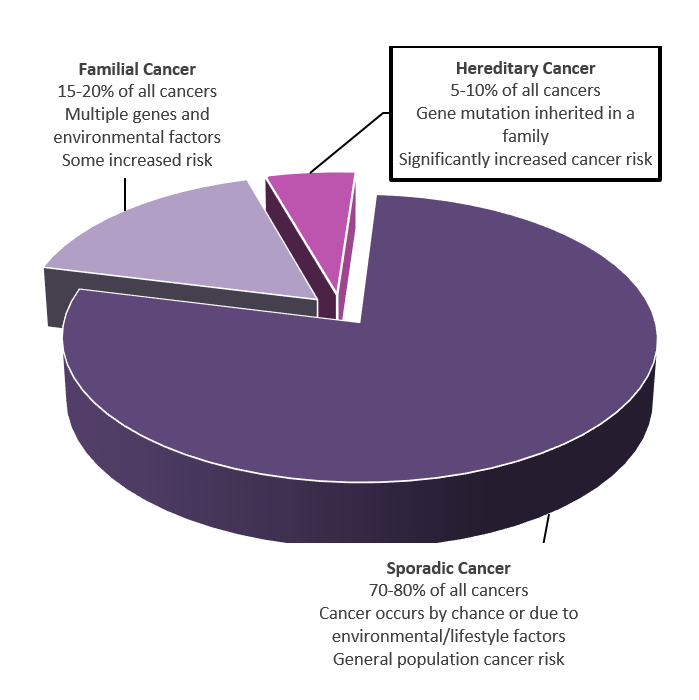Cancer Genetics
|
What is Cancer Genetics? The goal of cancer genetics is to identify individuals and families with an increased risk of developing cancer due to inherited gene mutations. The Northwestern Medicine Cancer Genetics team provides individualized cancer risk assessments, genetic counseling and testing, and health management recommendations for individuals and families at increased risk of developing cancer. With appropriate screening and medical management, cancers can be detected earlier (when they are more easily treated) and/or can be prevented altogether. If you are concerned about your personal and/or family history of cancer, our Cancer Genetics team can help you to make medical decisions to manage your cancer risk. Genes and Cancer About 5 to 10 percent of cancers are hereditary, or caused by gene mutations that can be passed down through a family. If an individual carries one of these mutations then his/her risk of developing certain types of cancer is increased compared to people without a mutation. However, not all people with a gene mutation will develop cancer. Genetic counseling and testing can help you and your family members to better understand your cancer risks and to develop a plan for cancer screening and prevention. |
Would Genetic Counseling Be Helpful For Me?
Most cancers are not genetic. However, in families with an inherited gene mutation, one or more of the following may be true:
- Cancer develops at a young age (prior to age 50)
- Multiple cancers develop in the same person
- For example: a woman with both breast and ovarian cancer OR a man/woman with both colon and stomach cancers
- Bilateral cancers (two cancers in a pair of organs—cancer in both breasts or both kidneys)
- The same type of cancer occurs in more than one family member
- Cancer is seen in multiple generations within the same family
- A gene mutation has been identified in one or more family members
If any of the above statements describes you and/or a family member, you may wish to consider scheduling an appointment in our Cancer Genetics Program. Appointments can be scheduled by calling 312.695.0320.
Our Services
Genetic specialists can determine if a genetic test is needed based on the pattern of cancer in a family. The test itself is a simple blood test. What you do with that information, however, can be a difficult decision. Our team of genetic counselors and physician-geneticists are available to discuss your personal and family history of cancer as well as the benefits and limitations of genetic testing. Together, we can help you decide if genetic testing is the right decision for you.
We provide comprehensive genetic counseling and testing for a variety of inherited cancer syndromes, including:
- Hereditary breast and ovarian cancer syndrome (caused by mutations in the BRCA1 and BRCA2 genes)
- Lynch syndrome (also known as HNPCC)
- Familial Adenomatous Polyposis (FAP)
- Multiple Endocrine Neoplasia, types 1 and 2 (MEN1 and MEN2)
- Cowden Syndrome
- Juvenile Polyposis Syndrome (JPS)
- Von Hippel-Lindau Disease
- Gorlin Syndrome (Nevoid Basal Cell Carcinoma Syndrome)
- Hereditary Diffuse Gastric Cancer Syndrome (HDGC)
- Tuberous Sclerosis (TSC)
- Li-Fraumeni Syndrome (LFS)
- Peutz-Jeghers Syndrome
- Birt-Hogg-Dubé Syndrome
- Hereditary Leiomyomatosis and Renal Cell Cancer (HLRCC)
- Hereditary Paraganglioma and Pheochromocytoma Syndrome
We also provide genetic counseling and testing related to newly discovered genes that have more recently been associated with increased risks for various types of cancers. Examples of these genes include PALB2, CHEK2, POLE, RAD51C, RAD51D, and NBN. Much of the scientific data surrounding these genes is limited at this time. Our specially trained genetic counselors and physician-geneticists can help you to interpret your genetic testing results within the context of your family history to help you make informed medical decisions based on up-to-date genetic knowledge.
Don’t see the gene you are looking for? Call us at 312.695.0320 to inquire about additional genes for which we provide genetic counseling and testing.
What Can I Expect During My Genetic Counseling Appointment?
Consultations with our Cancer Genetics team typically last 45 minutes to 1 hour. You may meet with multiple members of our Cancer Genetics team, including a genetic counselor and/or physician-geneticist. We will begin the appointment by collecting information related to your personal and family history of cancer. For many people, a comprehensive cancer risk assessment can be obtained without the use of genetic tests. However, in some cases, genetic testing can provide valuable information to guide you in making important decisions about your medical care.
Genetic testing recommendations will be based on your personal and family history, and your genetics team will review this information to determine which type of genetic testing, if any, may be recommended for you. Your genetic counselor will also explain information related to cancer genetics, inherited cancer syndromes, and cancer risks. If you elect to move forward with genetic testing, this can be completed with a blood draw at the end of your consultation or at a later date, if preferred.
How Can I Schedule An Appointment?
To learn more about the Northwestern Medicine Cancer Genetics Program and/or to schedule a consultation, you can call 312.695.0320.
Preparing For Your Appointment
Please plan to arrive 15 minutes prior to your scheduled appointment time. You should bring a copy of your current insurance card and a photo ID.
To allow us to provide an accurate cancer risk assessment for you and your family members, please collect a list of the following information prior to your visit:
- Types of cancers diagnosed in you and/or your family members (current or previous)
- Approximate ages at which any of those cancers were diagnosed
- Copies of previous genetic testing results for yourself and/or other family members (if you and/or any relatives have completed genetic testing in the past)
To help you collect this information, you are welcome to use our Cancer Genetics Questionnaire.
Please contact us at 312.695.0320 if you have any questions about the information needed for your visit.








